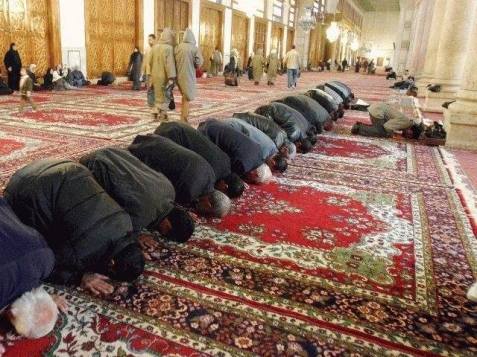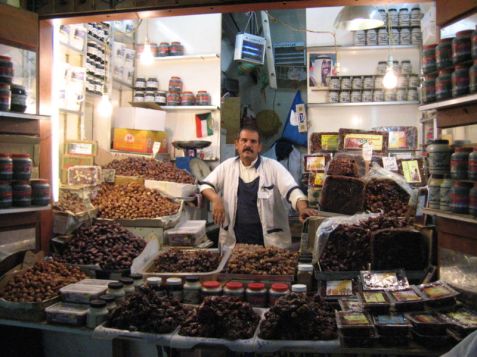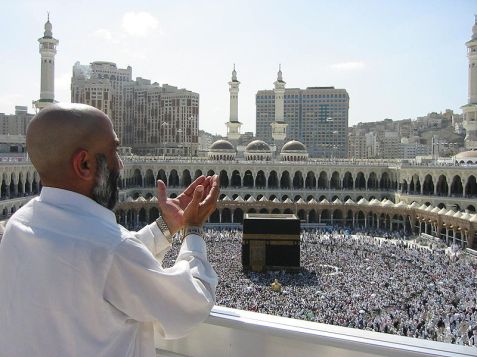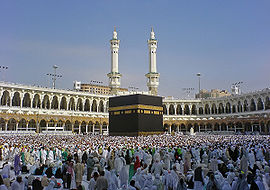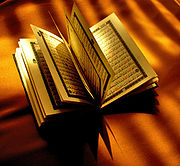-Islam is a monotheistic, Abrahamic religion originating with the teachings of the Islamic prophet Muhammad, a 7th century Arab religious and political figure. The word Islam is a homograph having multiple meanings and a triliteral of the word salam, which directly translates as peace. Other meanings include submission, or the total surrender of oneself to God . An adherent of Islam is known as a Muslim, meaning “one who submits [to God]”. The word Muslim is the participle of the same verb of which Islām is the infinitive. There are approximately 1.8 billion Muslims, making Islam the second-largest religion in the world, after Christianity.Muslims believe that God revealed the Qur’an to Muhammad, God’s final prophet, through the angel Gabriel, and regard the Qur’an and the Sunnah (words and deeds of Muhammad) as the fundamental sources of Islam. They do not regard Muhammad as the founder of a new religion, but as the restorer of the original monotheistic faith of Abraham, Moses, Jesus, and other prophets. Islamic tradition holds that Jews and Christians distorted the revelations God gave to these prophets by either altering the text, introducing a false interpretation, or both.
5 pillars of Islam
June 21, 2009 at 9:23 am (Uncategorized)
1.SHAHADA
–is a statement professing monotheism and accepting Mohammad as God’s messenger and there is no god but God. The shahadah is a set statement normally recited in Arabic, translated as: “[I profess that] There is no god but Allah, and Mohammad is the Prophet of Allah.”
2. Salat
-the second pillar of Islam is Salat, the requirement to pray 5 times a day at fixed times during the day. The times of day to pray are at dawn, noon, mid-afternoon, sunset, and night. Each salat is performed facing towards the Kaaba in Mecca. Salat is intended to focus the mind on Allah; it is seen as a personal communication with Allah, expressing gratitude and worship. According to the Qur’an, the benefit of prayer “restrains [one] from shameful and evil deeds”.Salat is compulsory but there is some flexibility in body and clothing. Nonetheless, the place of prayer must be cleansed. All prayers should be conducted within the prescribed time period (waqt) and with the appropriate number of units (raka’ah). While the prayers may be made at any point within the waqt, it is considered best to begin them as soon as possible after the call to prayer (that comes from a muezzin on minarets) is heard. The prayers are essentially expressions of adoration of God, but the worshipper may add his own personal request. The most commonly repeated prayer is the short first Sura, or Section of the Qu’ran, beginning, ‘Praise be to Allah, Lord of Creation, the compassionate, the merciful’.
3. Zakah
Zakah or alms-giving, is the practice of charitable giving by Muslims based on accumulated wealth, and is obligatory for all who are able to do so. It is considered to be a personal responsibility for Muslims to ease economic hardship for others and eliminate inequality. Zakat consists of spending 2.5% of one’s wealth for the benefit of the poor or needy, including slaves, debtors and travellers. A Muslim may also donate more as an act of voluntary charity (sadaqah), in order to achieve additional divine reward.There are two main types of Zakat. First, there is the kajj, which is a fixed amount based on the cost of food that is paid during the month of Ramadan by the head of a family for himself and his dependents. Second, there is the Zakat on wealth, which covers money made in business, savings, income, and so on. In current usage Zakat is treated as a 2.5% collections on most valuables and savings held for a full lunar year, as long as the total value is more than a basic minimum known as nisab (three ounces or 87.48g of gold). As of 20 September 2008, nisab is approximately US$2,640 or an equivalent amount in any other currency. Many Shi’ites are expected to pay an additional amount in the form of a khums tax, which they consider to be a separate ritual practice.
There are four principles that should be followed when giving the Zakat:
- The giver must declare to God his intention to give the Zakat.
- The Zakat must be paid on the day that it is due. If one fails to pay the Zakat, people think he is refusing to fulfill God’s wishes.
- Payment must be in kind. This means if one has a lot of money then he needs to pay 2.5% of his income. If he does not have much money, he needs to pay in a different way. For example, if he has a lot of cattle, then he pays in cattle instead of money.
- The Zakat must be distributed in the community from which it was taken.
4. Sawm during Ramadan
-many Muslims traditionally break their fasts in Ramadan with dates (like those offered by this date seller in Kuwait City), as was the recorded practice (Sunnah) of Muhammad.Three types of fasting (Sawm) are recognized by the Qur’an: Ritual fasting fasting as compensation or repentance and ascetic fasting. Ritual fasting is an obligatory act during the month of Ramadan. Muslims must abstain from food, drink, and sexual intercourse from dawn to dusk during this month, and are to be especially mindful of other sins. The fast is meant to allow Muslims to seek nearness to Allah, to express their gratitude to and dependence on him, to atone for their past sins, and to remind them of the needy. During Ramadan, Muslims are also expected to put more effort into following the teachings of Islam by refraining from violence, anger, envy, greed, lust, harsh language, gossip and to try to get along with people better than normal. In addition, all obscene and irreligious sights and sounds are to be avoided.Fasting during Ramadan is obligatory, but is forbidden for several groups for whom it would be very dangerous and excessively problematic. These include pre-pubescent children, those with a medical condition such as diabetes, elderly people, and pregnant or breastfeeding women. Observing fasts is not permitted for menstruating women. Other individuals for whom it is considered acceptable not to fast are those who are ill or traveling. Missing fasts usually must be made up soon afterward, although the exact requirements vary according to circumstance.
5. Hajj
-the hajj to the Kaaba, in Mecca, is an important practice in Islam.The Hajj is a pilgrimage that occurs during the Islamic month of Dhu al-Hijjah to the holy city of Mecca, and derives from an ancient Arab practice. Every able-bodied Muslim is obliged to make the pilgrimage to Mecca at least once in their lifetime if they can afford it. When the pilgrim is around ten kilometers from Mecca, he must dress in Ihram clothing, which consists of two white sheets. Both men and women are required to make the pilgrimage to Mecca, as the Hajj is mandatory for both males and females. After a Muslim makes the trip to Mecca, he/she is known as a hajj/hajja (one who made the pilgrimage to Mecca). The main rituals of the Hajj include walking seven times around the Kaaba, touching the Black Stone, travelling seven times between Mount Safa and Mount Marwah, and symbolically stoning the Devil in Mina. The pilgrim, or the haji, is honoured in their community. For some, this is an incentive to perform the Hajj. Islamic teachers say that the Hajj should be an expression of devotion to Allah, not a means to gain social standing. The believer should be self-aware and examine their intentions in performing the pilgrimage. This should lead to constant striving for self-improvement.A pilgrimage made at any time other than the Hajj season is called an Umrah, and while not mandatory is strongly encouraged.
Mosque
June 21, 2009 at 8:45 am (Uncategorized)
-a mosque is a place of worship for followers of Islam. Muslims often refer to the mosque by its Arabic name masjid . The word “mosque” in English refers to all types of buildings dedicated for Islamic worship, although there is a distinction in Arabic between the smaller, privately owned mosque and the larger, “collective” mosque , which has more community and social amenities.The mosque serves as a place where Muslims can come together for salat as well as a center for information, education, and dispute settlement. The Imam leads the prayer.They have developed significantly from the open-air spaces that were the Quba Mosque and Al-Masjid al-Nabawi in the 7th century. Many mosques have elaborate domes, minarets, and prayer halls. Mosques originated on the Arabian Peninsula, but are now found in all inhabited continents.All adult Muslims, with exceptions for the infirm, are required to offer Salat prayers five times daily. Most mosques will organise a formal time of prayer for each of the daily timeslots. In addition to holding the daily prayers, mosques hold weekly jumu’ah services which replace the midday prayer on Fridays. While daily prayers can be performed anywhere, it is required to attend Friday prayers at the mosque. The mosque is the center of the Islamic community, illustrating the idea of brotherhood and iman. A funeral prayer, or salat ul-janazah, is normally held for a deceased Muslim outdoors in a courtyard or square close to the mosque, with all congregants present, including the imam, participating. During eclipses, mosques will host special prayers called eclipse prayers.There are two large holidays (Eids) in the Islamic calendar, Eid ul-Fitr and Eid ul-Adha during which there are special prayers held at mosques in the morning. These Eid prayers are supposed to be offered in large groups, and so larger mosques will normally host them for their congregants as well as the congregants of smaller local mosques. Some mosques will even rent convention centers or other large public buildings to hold the large number of Muslims who attend. Mosques, especially those in countries where Muslims are the majority, will also host Eid prayers outside in courtyards or town squares.As ritual purification precedes all prayers, mosques often have ablution fountains or other facilities for washing in their entryways or courtyards. However, worshippers at much smaller mosques often have to use restrooms to perform their ablutions. In traditional mosques, this function is often elaborated into a freestanding building in the center of a courtyard. This desire for cleanliness extends to the prayer halls where shoes are disallowed to be worn anywhere other than the cloakroom. Thus, foyers with shelves to put shoes and racks to hold coats are commonplace among mosques.
THE QUR AN
June 21, 2009 at 7:45 am (Uncategorized)
The Qur’an also sometimes transliterated as Quran, Qur’ān, Koran, Alcoran or Al-Qur’ān) is the central religious text of Islam. Muslims believe the Qur’an to be the book of divine guidance and direction for mankind, and consider the original Arabic text to be the final revelation of God
Islam holds that the Qur’an was revealed to Muhammad by the angel Jibrīl (Gabriel) from 610 CE to his death in 632 CE.Followers of Islam further believe that the Qur’an was written down by Muhammad’s companions while he was alive, although the primary method of transmission was oral. It is maintained that in 633 CE, the written text was compiled, and in 653 CE it was standardized, distributed in the Islamic empire and produced in large numbers. The present form of the Qur’an is regarded by Muslims as God’s revelation to Muhammad. Academic scholars often consider it the original version authored or dictated by Muhammad. Muslim tradition agrees that it was fixed in writing shortly after Muhammad’s death by order of Umar and Abu Bakr.

